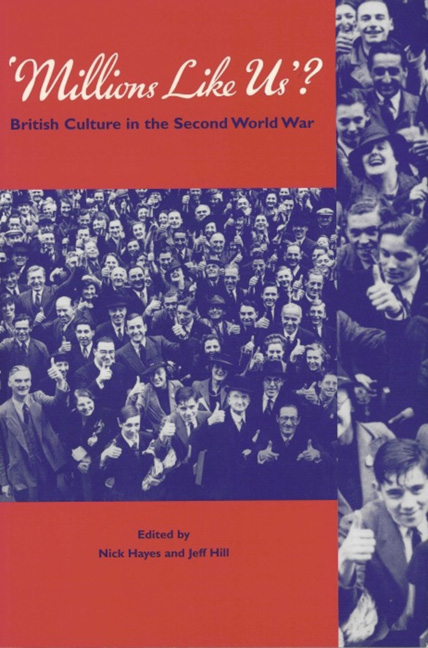Book contents
- Frontmatter
- Contents
- List of Figures and Tables
- Notes on Contributors
- Acknowledgements
- An ‘English War’, Wartime Culture and ‘Millions Like Us’
- British Cinema and ‘The People's War’
- The People's Radio: The BBC and its Audience, 1939–1945
- Was it the Mirror Wot Won it? The Development of the Tabloid Press During the Second World War
- A More Even Playing Field? Sport During and After the War
- A Time for Hard Writers: The Impact of War on Women Writers
- Safe and Sound: New Music in Wartime Britain
- More Than ‘Music-While-You-Eat’? Factory and Hostel Concerts, ‘Good Culture’ and the Workers
- ‘When Work Is Over’: Labour, Leisure and Culture in Wartime Britain
- Not Just a Case of Baths, Canteens and Rehabilitation Centres: The Second World War and the Recreational Provision of the Miners’ Welfare Commission in Coalmining Communities
- ‘You and I – All of Us Ordinary People’: Renegotiating ‘Britishness’ in Wartime
- Postscript: A War Imagined
- Index
‘When Work Is Over’: Labour, Leisure and Culture in Wartime Britain
- Frontmatter
- Contents
- List of Figures and Tables
- Notes on Contributors
- Acknowledgements
- An ‘English War’, Wartime Culture and ‘Millions Like Us’
- British Cinema and ‘The People's War’
- The People's Radio: The BBC and its Audience, 1939–1945
- Was it the Mirror Wot Won it? The Development of the Tabloid Press During the Second World War
- A More Even Playing Field? Sport During and After the War
- A Time for Hard Writers: The Impact of War on Women Writers
- Safe and Sound: New Music in Wartime Britain
- More Than ‘Music-While-You-Eat’? Factory and Hostel Concerts, ‘Good Culture’ and the Workers
- ‘When Work Is Over’: Labour, Leisure and Culture in Wartime Britain
- Not Just a Case of Baths, Canteens and Rehabilitation Centres: The Second World War and the Recreational Provision of the Miners’ Welfare Commission in Coalmining Communities
- ‘You and I – All of Us Ordinary People’: Renegotiating ‘Britishness’ in Wartime
- Postscript: A War Imagined
- Index
Summary
. . . the subject I have been given is practically a death trap.
Towards the end of the momentous edition of Picture Post of 4 January 1941, after the arguments for reform in areas such as employment, health, education and housing, the writer and broadcaster J. B. Priestley turned his attention to the quality of life. Picture Post was perhaps the most popular wartime forum for discussion of ‘reconstruction’, and its themes showed a marked convergence with sentiments expressed in the labour movement. Though not itself an organ of the movement, many of its writers were people of progressive views. The 4 January edition, entitled ‘A Plan For Britain’, included contributions from A. D. Lindsay, Julian Huxley, the economist Thomas Balogh and the architect Maxwell Fry – all of whom would doubtless have subscribed to a ‘social democratic consensus’. Priestley certainly did. There had been a hint of it as early as 1934 in his screenplay for the popular Gracie Fields film Sing As We Go. As an established novelist, dramatist, journalist and (most recently) radio broadcaster who the BBC feared was attaining demagogic status in his ‘Postscript’ talks, his views carried great influence, especially with a ‘popular’ audience. He had, moreover, clear associations with the Left. By lending his weight to questions of leisure, recreation and culture there seemed a reasonable hope that such issues might be introduced into the labour movement's thinking on reconstruction, and that reforms in leisure might be added to those being considered on material problems. The questions to be posed by this essay are, therefore: did Labour's contribution to the discourse of reconstruction during the Second World War encompass the qualititative as well as the material aspects of life? And, if so, how did the labour movement propose to deal with leisure and culture? They are questions that historians, in the welter of debate on ‘the people's war’, have usually overlooked. The essay will argue that the wartime labour movement, and especially the Labour Party, evinced little interest in questions of leisure and the quality of life.
- Type
- Chapter
- Information
- Millions Like Us?British Culture in the Second World War, pp. 236 - 260Publisher: Liverpool University PressPrint publication year: 1999

